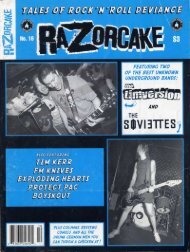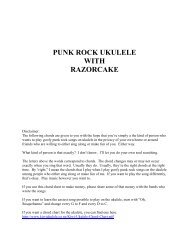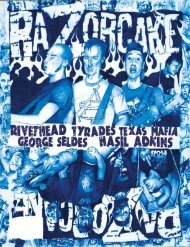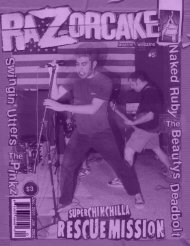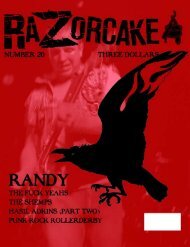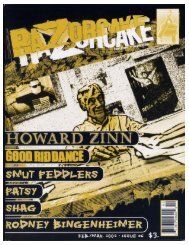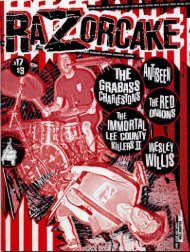issue #02 pdf - Razorcake
issue #02 pdf - Razorcake
issue #02 pdf - Razorcake
You also want an ePaper? Increase the reach of your titles
YUMPU automatically turns print PDFs into web optimized ePapers that Google loves.
THE WAR AGAINST OBLIVION:<br />
THE ZAPATISTA CHRONICLES<br />
John Ross, paperback, 350 pgs.<br />
"This war is always a matter of the corn patch<br />
vs the World Bank, the hoe against the stock<br />
market, the poorly armed guerrilla band against<br />
a military armed to the teeth by the Pentagon,<br />
the village against the World Trade<br />
Organization, the smallest of the small against<br />
the Fortune 500, the local against the global, the<br />
many against the few…"<br />
-John Ross<br />
Every now and then, I read a book, and I<br />
enjoy it so much and feel it is so important that<br />
I wish I could convince everyone to read it. I<br />
felt that way with Emma Goldman's autobiography<br />
of anarchy and resistance, Living My Life. I<br />
felt that way about Philip Gourevitch's narrative<br />
about the Rwanda Genocide, We Wish to Inform<br />
You That Tomorrow We Will Be Killed with Our<br />
Families. And, right in between those two,<br />
sharing Goldman's spirit and fight and<br />
Gourevitch's ability to balance the tragic and<br />
absurd, is John Ross's chronicle of the situation<br />
in Chiapas, Mexico, The War Against<br />
Oblivion. First, a bit of history for the uninformed.<br />
On January 1, 1994, the first day that<br />
the North American Free Trade Agreement<br />
was in effect, the Zapatista Army of<br />
National Liberation (EZLN) marched into<br />
San Cristobal and five other municipal seats<br />
in the southern Mexican state of Chiapas<br />
and declared war on the Mexican government.<br />
The military presence in San<br />
Cristobal was minimal. Most of the soldiers<br />
had been given leave for the<br />
86<br />
holidays. The rebels quickly took control<br />
of the town and <strong>issue</strong>d the First<br />
Declaration of the Lacandon Jungle, a<br />
document explaining the rebels' position.<br />
Essentially, the EZLN were fighting<br />
for indigenous rights in Mexico.<br />
Specifically, they took <strong>issue</strong> with the<br />
Mexican government's re-writing of<br />
Article 27. Article 27 was one of the<br />
most important results of the Mexican<br />
revolution, pushed by Emiliano Zapata<br />
to give communal lands to the Indians in<br />
Mexico. Carlos Salinas, then-president<br />
of Mexico, essentially took away those<br />
communal lands and offered them up to<br />
big businesses "to buy, rent, or enter into<br />
association" with. The re-writing of<br />
Article 27 was one of the conditions of<br />
NAFTA.<br />
Delivering the First Declaration of<br />
the Lacandon Jungle was<br />
Subcommandante Marcos, an eloquent,<br />
ski-masked mestizo (a person of mixed<br />
blood, not indigenous to Chiapas). The<br />
press immediately latched on to Marcos<br />
as the commander of the EZLN. But no,<br />
Marcos assured everyone, he was not in<br />
charge. He simply spoke for the Indians<br />
from whom NAFTA had stolen land.<br />
Rebels in the five other cities didn't<br />
fare quite so well. The Mexican Army<br />
rallied pretty quickly, and for the next<br />
twelve days, a shooting war broke out.<br />
On January 12, 1994, Carlos Salinas<br />
declared a cease fire. What followed<br />
has been six years of low intensity warfare:<br />
a series of negotiations between the<br />
EZLN and the Mexican government; the formation<br />
of paramilitary groups (otherwise known as<br />
Mexican and US armed death squads); the formation<br />
of guerrilla armies; the massacres and<br />
rapes of random civilians and farmers; sporadic<br />
battles for land; increased military presence;<br />
agreements made and broken; and basically the<br />
Mexican government following the example<br />
that the US government set in the Indian<br />
Wars last century. This is the subject<br />
of The War Against Oblivion.<br />
Prior to reading The War Against<br />
Oblivion, I didn't know too much about<br />
the situation in Chiapas. I knew that there<br />
had been a short shooting war. I knew<br />
that people were starving. I knew that<br />
different educational groups had been<br />
soliciting money for schools in Chiapas.<br />
I noticed a lot of references to Chiapas in<br />
reports of protests of the WTO in Seattle and the<br />
World Bank/IMF in DC. I'd read a handful of<br />
articles in both mainstream and leftist magazines,<br />
and most of the articles I read had that<br />
Sally Struthers, these-children-are-starving,won't-you-please-help<br />
kind of tone. Or else they<br />
had the one-dimensional, hysterically politically<br />
correct tone. I'd meant to inform myself<br />
more on the subject, but I'm probably like most<br />
people in the sense that I can only take so much<br />
of that. I guess I have a finite amount of empathy<br />
and articles that take dramatic or horrific<br />
events and just hit you over the head with them<br />
overwhelm me.<br />
That said, John Ross does a fantastic job of<br />
transmitting a dazzling amount of information<br />
on the Zapatistas and the general political climate<br />
of Mexico. He lets the drama stand for<br />
itself and covers the low intensity warfare with<br />
a subtle but stinging wit. John Ross basically<br />
sounds like your favorite political science professor<br />
after he's had a few beers and decided not<br />
to hold his tongue.<br />
Of course, The War Against Oblivion is not<br />
an objective book at all. Ross is an unapologetic<br />
supporter of the Zapatistas as well as a<br />
vicious critic of the Mexican government, the<br />
PRI (the ruling political party in Mexico), Bill<br />
Clinton, NAFTA, the World Trade<br />
Organization, the World Bank/ International<br />
Monetary Fund, and big business in general.<br />
Ross's subjectivity doesn't bother me at all,<br />
though, because nothing is objective. The<br />
mainstream American press wasn't objective<br />
when it chose to ignore guerilla warfare in<br />
Mexico prior to the signing of NAFTA (a choice<br />
which, incidentally may have lead to the passing<br />
of NAFTA). The mainstream American<br />
press isn't objective when it chooses to ignore<br />
the fact that our neighbors to the south have<br />
been actively engaged in a revolution for the<br />
past seven and a half years. And the mainstream<br />
American press certainly isn't being<br />
objective when it chooses to ignore the fact that<br />
most of the Indians being shot in Chiapas<br />
are standing on US oil and are being<br />
shot with US bullets coming out of US<br />
guns by soldiers led by US trainedcommanders<br />
who drive US trucks<br />
to their US helicopters. Ross, on<br />
the other hand, wears his point<br />
of view like a press pass, yet<br />
rather than choosing to





